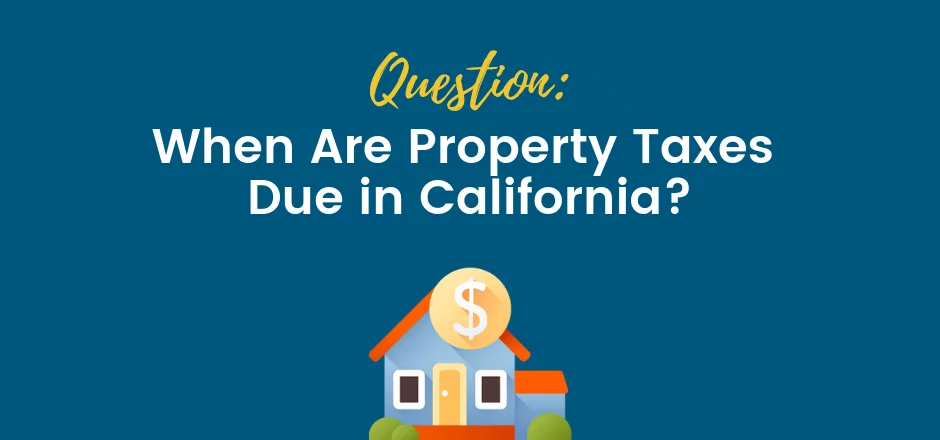When Are Property Taxes Due in California?
If you recently purchased real estate in California, you may have a few questions relating to property taxes. It’s a complicated topic so we thought we would start with one of the most common questions we hear from residents in San Fernando Valley, California.
When are property taxes due in California?
When Are Property Taxes Due in California?
California’s legal system can be complex, especially around taxes and land ownership.
Today, we thought it might be helpful to take a closer look at some of the different aspects of property taxes in California so you have a better understanding. In this article, we’re going to dive into how the property tax system works, explore the differences between secured property taxes and unsecured property taxes, the penalties for delinquent payments and what happens if you can’t pay.
Let’s get started …
How California’s Property Tax System Works
California’s property tax system works differently than the systems found in most other US states for a few different reasons. First, California’s “fiscal year” runs from July 1st to June 30th, but property taxes are regulated by each county, not by each state. Furthermore, taxes are paid partially in arrears and partially in advance on regulated due dates set by the California State Board of Equalization.
This is right about where most taxpayers find themselves confused. The county is responsible for setting property tax rates and collecting on taxes, yet the state is responsible for regulating due dates and liens. To simplify, you can generally assume the County is your first point of contact if you have questions or issues with your property taxes during the year, including the following:
- When are property taxes due in California?
- What months do property taxes cover?
- What is the California property tax schedule?
Secured Property Tax Due Dates in California
The California State Board of Equalization sets yearly property tax installments on two distinct dates. However, these dates are subject to change year-to-year, so you should never assume that last year’s dates will remain accurate. When in doubt, check with your local office to ensure you have the most accurate, up-to-date information.
Alternatively, you can reach out to the BOE at 1-916-274-3250.
According to the Los Angeles County Property Tax website (located here), counties mail out tax assessments (tax bills) every year in early October. However, you don’t need to pay the entire bill right away. Instead, you pay your first installment on or before November 1st. The second installment isn’t due until much later – February 1st of the following year. In situations where the due date falls on a holiday or on a weekend, you can safely assume you aren’t delinquent as long as you pay by no later than the next business day.
Installments are calculated and regulated by the BOE. However, you do have the option to pay both installments at once, if desired. Some homeowners find this easier because it gets the payment out of the way faster. This also ensures you don’t accidentally forget to pay the second installment in February.
Don’t feel bad if you can’t pay both installments at once. That’s exactly why the two-installment system works; it gives homeowners more room to budget for the twice-yearly payment. As long as you pay each installment by the due date, you are well within your legal right to wait.
When Do Secured Property Taxes Become Delinquent?
Secured property taxes officially become delinquent when the first installment is paid later than 5:00 p.m. on December 10th, or when the second installment is paid later than 5:00 p.m. on April 10 of the following year. For the purposes of exact designation, the county and the BOE also considers a property tax bill “paid on time” if it is mailed out and postmarked before these dates, too. What this means is that you can mail a check at the very last minute (on December 10th at 9:00 a.m., for example) and still qualify as having paid on time with no penalty fees.
However, it’s important to note that you shouldn’t leave your property taxes to the very last minute unless it’s absolutely necessary. Mailing a check on deadline day may force you to become delinquent simply because USPS doesn’t process the letter through their system on time, and that can lead to big-time fees.
What is the Fee for Delinquent Property Taxes?
In the State of California, delinquent property taxes immediately incur a 10 percent additional fee. That fee becomes due immediately with payment of the past-due taxes. For example, if you owed the county $10,000 in land taxes, and you became delinquent, you would then owe $11,000 instead (an additional 10 percent, or $1000, is added to the bill as a “late payment fee.”
If you cannot pay the bill plus late fees within 30 days of the delinquent date, you will continue to incur fees at monthly intervals. As of 2019, this fee is 1.5 percent of your total tax bill including the additive 10 percent late penalty fee.
For example, if you initially owed $11,000 as previously mentioned, your bill would increase by $165 during month two (1.5 percent of the total) for a total of $11,165. If you still haven’t paid by month three, another 1.5 percent of the new total will be added for a total of $11,332.48.
Although the due dates and delinquent dates are technically different, and even though it’s best to pay by the due date, the slight gap can be helpful. If an emergency arises or you aren’t able to pay as you thought you would be able to, it will give you time to contact the county or BOE and make other arrangements for your property taxes.
Some homeowners always consider the delinquent date as the due date, although it can be risky – especially if you’re financially insecure.
Related: What Does a Tax Attorney Do?
Unsecured Property Tax Rules
Unsecured property is any property that isn’t assigned to land, a house, or a specific building. This might include boats, tiny homes, airplanes, business properties, or even mobile and modular homes that can be moved from place-to-place.
Unlike secured property taxes, unsecured property taxes are not charged in installment payments. Instead, they’re due once per year, with a rolling due date based on your month of enrollment. For example, if you buy unsecured property on January 1st, your taxes will become due on August 31. Delinquency follows one day later on September 1st.
If you purchase unsecured property in August, the due date becomes September 30 (delinquency occurs on November 1st). If you purchase in September, your due date will be October 30th (with a delinquency on November 1). October purchases must be paid by November 30, while November purchases have a due date of December 31. December purchases are always billed for taxes due January 31st of the next year. The date of delinquency is always one day after the due date.
What If You Can’t Pay?
Sometimes, we run into financial struggle despite the best of intentions. Maybe a family member becomes ill or someone loses their employment. If you cannot pay your property taxes in California, you do have options. However, it is critical that you address the problem and work closely with your local office right away. Don’t ignore the bill or hope they’ll just stop contacting you – they won’t, and they might even place an additional lien or foreclosure on your house.
If you have concerns about your taxes, speak with a lawyer who can help you navigate complex property tax law. Their expertise can be invaluable in saving you money or even saving your home.
Related: What Happens if You Don’t File Your Taxes?
Are you in search for a certified attorney to represent you?
Let us help you find one today!



